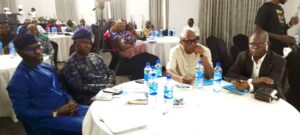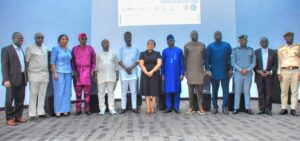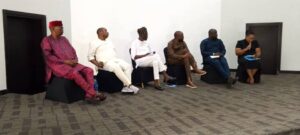
Joyce Mmereole Okoli
Corruption, inefficiencies, and knowledge deficits in Nigeria’s maritime and trade sectors have been identified as critical barriers to fully realizing the benefits of the African Continental Free Trade Area (AfCFTA). These concerns were raised during the second edition of the Maritime Reporters’ Association of Nigeria (MARAN) Annual Maritime Lecture (MAMAL), held at the Providence Hotel, Ikeja GRA, Lagos.
Themed *“AfCFTA: Dismantling Trade Barriers, Navigating Regional Trade,”* the event brought together key players in the maritime and trade industries to deliberate on strategies to enhance Nigeria’s competitiveness under AfCFTA.
Dr. Kayode Farinto, former Acting President of the Association of Nigerian Licensed Customs Agents (ANLCA), spotlighted corruption as a significant hindrance to trade. “Corruption is a two-way street. Systemic inefficiencies push importers to circumvent procedures through bribery. Streamlining operations and enforcing accountability are critical to reforming the maritime sector,” Farinto said.

He praised past reforms under former Minister Ngozi Okonjo-Iweala that reduced the number of security agencies at ports but lamented the reversal of those gains.
Echoing his sentiments, Sesan Onileimo, Publisher of *Shipping Position Daily*, described inefficiencies at Nigerian ports as self-imposed barriers that exacerbate corruption. He highlighted the lack of coordination among agencies like the Nigeria Customs Service (NCS) and Standards Organisation of Nigeria (SON), which slows cargo clearance and encourages illicit practices.

“These agencies weren’t established to hinder trade, but their inefficiencies have turned them into bottlenecks. The chaos at Apapa contrasts sharply with seamless cargo clearance in neighboring countries like Benin Republic,” Onileimo noted.
On her part, Olatunde Olatunde, Promotion Officer at the Nigerian Export Promotion Council (NEPC), emphasized knowledge gaps among exporters as a major issue. She noted that many Nigerian exporters fail to meet international standards for packaging, labeling, and certification, limiting their access to global markets.

“Exporters need to understand trade agreements like AfCFTA and meet global requirements. Bridging this knowledge gap is essential for Nigeria to take full advantage of AfCFTA opportunities,” Olatunde said.
Emmanuel Maiguwa, President of the Maritime Security Providers Association of Nigeria (MASPAN), addressed the excessive costs of maritime operations in Nigeria, attributing high customs duties and inefficiencies at ports to inflated trade costs and corruption.
“Acquiring a vessel in Nigeria comes with prohibitive customs duties and red tape. These conditions drive businesses to cut corners, further entrenching corruption,” Maiguwa remarked.
Adding to the discussion, Capt. Tony Onoharigho, Rector of Conarina Maritime Academy, called for urgent improvements in logistics and transportation. He underscored the need for dedicated shipping vessels to reduce export costs and enhance trade efficiency.
“We need to prioritize logistics and transportation. Without optimized supply chains and our own shipping vessels, taking advantage of AfCFTA will remain a challenge,” Onoharigho stated.
Capt. Waredi Enisuoh, Executive Director of Operations at Tantita Security Services, highlighted the importance of adopting clean energy to enhance Nigeria’s global trade positioning. “Clean energy will be a game-changer. Businesses adopting solar energy can earn carbon credits and compete better internationally,” he said.
The speakers urged the government to tackle corruption, eliminate bottlenecks, and improve transparency within the maritime sector. They also called for investments in maritime infrastructure, including roads, trailer parks, scanning facilities, and additional vessels, to meet growing intra-African trade demands.
MARAN President, Godfrey Bivbere, noted some progress under AfCFTA, citing Nigeria’s successful participation in the Guided Trade Initiative, where companies like Lucky Fibres and LE LOOK Nigeria Limited exported goods to African countries.
However, he stressed the need for further capacity building, compliance with trade protocols, and investment in maritime assets to sustain these gains.
The event concluded with awards recognizing excellence in the maritime sector, presented to distinguished stakeholders, including Comptroller Dera Nnadi of the Tin Can Island Command and other industry leaders.

